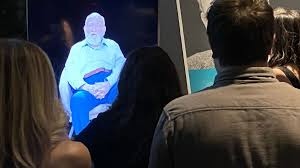Canberra: The development of science and the experience of technology has now made possible what was impossible to even imagine. Could you ever imagine that it is possible to talk to your ancestors who died hundreds of years ago? … Probably not. But scientists have now made this impossible possible. According to the report of The Conversation, now with the power of science and technology, you can also talk to your dead ancestors face to face. You can tell them your things, know all their well-being. Ancestors will also answer all your questions and even after being dead, will come in front and bless you to move forward in life.
You must have been shocked to hear this. But don’t be surprised, due to Artificial Intelligence (AI) and some other technologies, it has now become possible to talk to dead people. Although it may sound very scary and risky, but now science has done the biggest miracle of the world. Although this claim of scientists may seem like stepping into a fictional movie through a virtual reality (VR) headset, which is thrilling and a little scary. But now this has become possible in the digital world.
How will you talk to your ancestors on video?
As soon as you start talking to this digital father, you will find yourself on an emotional rollercoaster. Then you will uncover secrets and stories that you never knew, which changes the way you remember the real person. This is not a far-fetched or imaginary scenario. Now this has become possible because of the digital afterlife industry, which is developing rapidly. Many companies promise to create virtual reconstructions of dead persons based on their digital footprints. From artificial intelligence (AI) chatbots and virtual avatars to holograms, this technology offers a strange mix of comfort and disruption. It can draw us into deeply personal experiences that blur the lines between past and present, memory and reality.
There will be a flood of digital afterlife industries
The digital afterlife industry is now growing to allow you to video call your ancestors. However, it poses several significant ethical and emotional challenges. These include concerns about consent, privacy, and psychological impact on life. What is the digital afterlife industry? VR and AI technologies are making virtual reconstructions of our loved ones possible. Companies in this specific industry use data from social media posts, emails, text messages, and voice recordings to create digital personalities that can interact with living people. However, it is not that widespread yet. The number of such people is increasing in the digital afterlife industry. Hereafter gives users the ability to record stories and messages during their lifetime, which can later be accessed by their loved ones posthumously.
Messages from ancestors will come even after death

This thing is more curious and surprising too… that after death, can a person send you a message on mobile? You will not believe it at the moment, but now the answer may be yes. MyWishes offers the ability to send pre-determined messages after death while maintaining a presence in the lives of the living. Hanson Robotics has created robotic busts that communicate with people using the memories and personality traits of the deceased. Project December gives users access to so-called “deep AI” to engage in text-based conversations with people who have died. Generative AI also plays a key role in the digital afterlife industry. These technologies enable the creation of highly realistic and interactive digital personalities.
Convenience also brings dangers
This technology also brings dangers with convenience. The high level of realism can blur the line between reality and simulation. This can enhance the user experience, but can also cause emotional and psychological distress. Digital afterlife technologies can aid the grieving process by providing continuity and connection with the deceased. Hearing a loved one’s voice or seeing their likeness can provide comfort and help overcome loss.
For some of us, these digital immortals can be therapeutic tools. They can help us preserve positive memories and feel close to loved ones even after they have passed away. But for others, the emotional impact can be deeply negative, which can exacerbate rather than alleviate grief. There is the potential for psychological harm to loved ones if they have unwanted interactions with them. This can essentially lead to “digital awe.”




